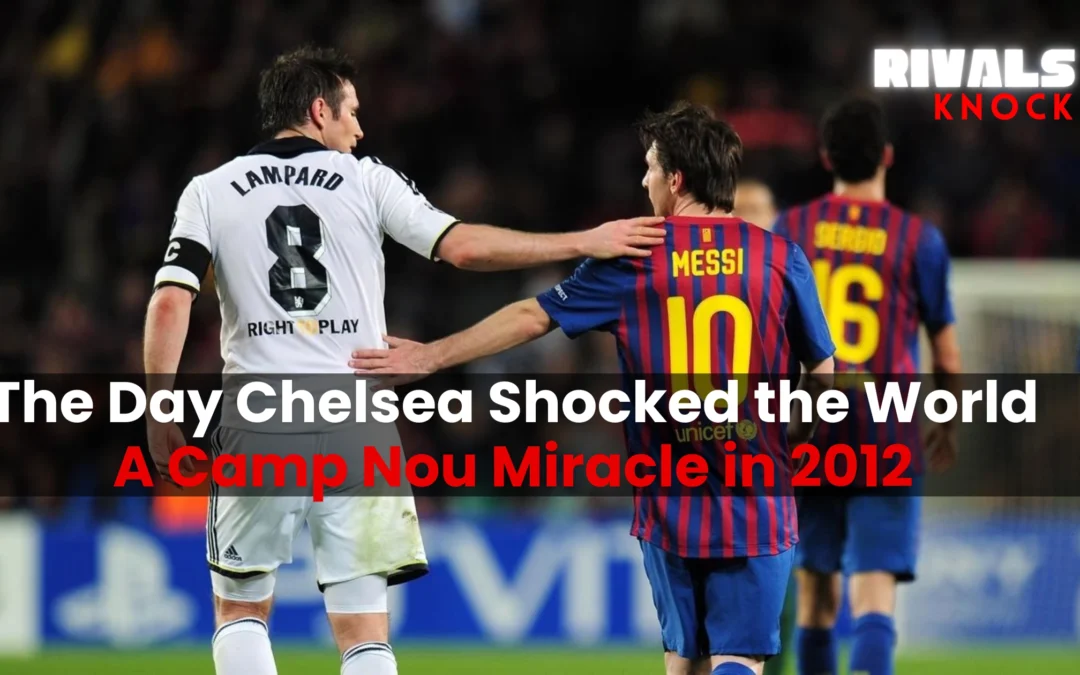A Stage Set for Revenge: The Camp Nou Roars
On April 24, 2012, the Camp Nou stood like a coliseum of dreams and nightmares, packed with 95,845 fans—a sea of Blaugrana ready to cheer Barcelona to another Champions League final. The defending champions, led by Pep Guardiola, were football’s gold standard, their tiki-taka style a symphony of possession and flair. Lionel Messi, Xavi, and Andrés Iniesta formed a spine that seemed unbreakable. Chelsea, on the other hand, were underdogs, a team in transition under interim manager Roberto Di Matteo. They carried a 1-0 lead from the first leg at Stamford Bridge, thanks to Didier Drogba’s goal, but few believed they could survive the Camp Nou cauldron. Three years earlier, in 2009, Chelsea had been robbed by referee Tom Henning Øvrebø’s decisions in a semi-final loss to Barcelona, fueling a thirst for revenge. This was more than a match—it was a chance to right a wrong, witnessed by a roaring crowd hungry for Barcelona’s triumph.
Chaos in the First Half: Chelsea’s Nightmare Unfolds
The match exploded into life with Barcelona dominating possession, holding 82.5% of the ball by the end. Chelsea’s plan was clear: sit deep, soak pressure, and hit on the break. But disaster struck early. In the 12th minute, Gary Cahill limped off injured, replaced by José Bosingwa, leaving Chelsea’s defense shaky. Barcelona pounced, with Sergio Busquets heading in a corner in the 35th minute to level the aggregate score at 1-1. Two minutes later, John Terry’s moment of madness saw him knee Alexis Sánchez off the ball, earning a straight red card. Down to 10 men, Chelsea’s hopes seemed to vanish. The Camp Nou erupted again in the 43rd minute when Iniesta slotted past Petr Čech after a slick move, making it 2-0 on the night, 2-1 on aggregate. Yet, in the dying seconds of the half, Ramires delivered a lifeline—latching onto a Frank Lampard pass, he chipped Víctor Valdés with a delicate lob, pulling Chelsea level at 2-2 on aggregate. At halftime, the scoreline was fragile, but Chelsea’s spirit was unbroken.
A Tactical Chess Game: Di Matteo vs. Guardiola
The second half was a battle of wits between Di Matteo and Guardiola. Barcelona’s 82.5% possession translated into 23 shots, 6 on target, but Chelsea’s low block was a wall of defiance. Di Matteo’s men, with only 17.5% possession, managed just 7 shots, 3 on target, yet their discipline was remarkable. Petr Čech made 4 crucial saves, including a stunning stop from Carles Puyol’s header in stoppage time. Barcelona’s relentless pressure saw Messi hit the post from a penalty in the 49th minute—a rare miss that kept Chelsea alive. Guardiola pushed his full-backs, Dani Alves and Adriano, high to stretch Chelsea’s defense, but Di Matteo countered by packing the midfield with Lampard and John Obi-Mikel, who tracked Messi tirelessly. Chelsea’s 10 men defended with heart, their 6 yellow cards a sign of their physical commitment. As the clock ticked down, Barcelona grew desperate, their passing less precise, while Chelsea’s belief grew. This wasn’t just a game—it was a test of resilience.
The Moment of Catharsis: Torres Silences the Camp Nou
In the 90th minute, with Barcelona pushing everyone forward, a long clearance found Fernando Torres—the £50 million striker who had struggled since joining Chelsea in 2011. With the Camp Nou holding its breath, Torres sprinted clear, rounded Valdés, and rolled the ball into an empty net. The score was 2-2 on the night, but Chelsea led 3-2 on aggregate. The stadium fell silent, save for the 1,000 Chelsea fans erupting in the stands. It was pure catharsis—a moment of redemption for Torres, who had endured 15 months of criticism, and for Chelsea, who had waited three years to avenge 2009. Barcelona had one final chance, but Puyol’s header was tipped wide by Čech. When the whistle blew, Chelsea had done the impossible, knocking out the European champions with 10 men, against all odds. Di Matteo’s men had turned the Camp Nou into a theater of stunned silence.
Heroes and Heartbreak: The Players Who Defined the Night
Chelsea’s heroes were everywhere. Petr Čech’s 4 saves, including the late stop, were monumental. Ramires, with his chipped goal, showed flair under pressure before his booking ruled him out of the final. Frank Lampard, with 90% pass accuracy, was the calm amid the storm, his assist for Ramires a stroke of genius. Fernando Torres, often a scapegoat, became the unlikely savior, his goal a dagger to Barcelona’s heart. For Barcelona, Iniesta’s goal and 92% pass accuracy showcased their brilliance, but Messi’s penalty miss—a rare lapse—proved costly. Busquets’ opener had given them hope, but their inability to break Chelsea’s resolve left them shattered. The 95,845 fans, expecting a coronation, left heartbroken, while Chelsea’s traveling supporters celebrated a miracle. This match wasn’t about stats—it was about heart, grit, and belief.
A Legacy of Resilience: What This Meant for Chelsea
Chelsea’s 3-2 aggregate win wasn’t just a victory—it was a statement. They went on to win the 2012 Champions League, beating Bayern Munich on penalties in the final, with Drogba scoring the decisive kick. This semi-final, however, remains a defining chapter in Chelsea’s history, a testament to their never-say-die spirit. For Barcelona, the loss marked the beginning of the end for Guardiola’s golden era—he left the club that summer, his dream of a third Champions League title unfulfilled. The match showed that even the best can be toppled by sheer determination. Rivals Knock looks back on this night as a reminder: football isn’t just about beauty—it’s about fighting for every moment. What’s your take on this iconic clash? Did Chelsea’s grit inspire you, or did Barcelona’s heartbreak hit harder? Share your thoughts on X with #ChelseaBarca2012 and let’s relive the drama!

